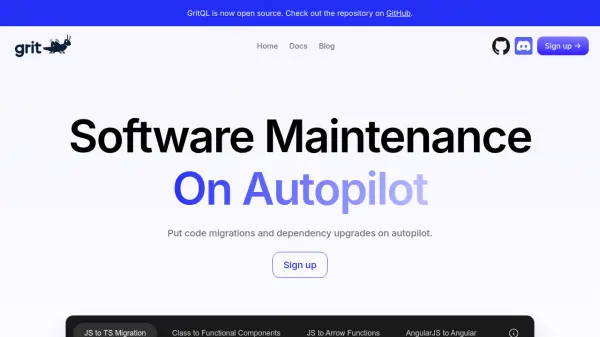What is Grit?
Grit provides developers with tools designed for automated code maintenance and transformation. It leverages GritQL, a specialized query language, to define and execute intricate code refactoring and migration tasks across a wide array of programming languages, including JavaScript/TypeScript, Python, Java, Terraform, Solidity, Markdown, Rust, Go, SQL, and CSS.
The primary goal of Grit is to streamline development workflows by automating repetitive code modifications, thereby saving significant developer hours. This automation ensures code consistency and simplifies the process of implementing large-scale updates or migrations. Grit offers both a command-line interface (CLI) for individual developers and open-source projects, alongside comprehensive enterprise solutions featuring GitHub integration, automated pull request generation, custom pattern support, and flexible deployment options (cloud or on-premise).
Features
- Automated Refactoring: Supports automated code changes across 12+ languages.
- GritQL Engine: Utilizes a dedicated query language for defining code transformations.
- CLI Tool: Offers a command-line interface for local use and pattern development.
- Multi-Language Support: Works with JavaScript/TypeScript, Python, JSON, YAML, Java, Terraform, Solidity, Markdown, Rust, Go, SQL, CSS.
- GitHub Integration: Seamlessly integrates with GitHub workflows (Enterprise).
- Automated Pull Requests: Generates pull requests automatically for code changes (Enterprise).
- Standard Migrations Library: Access to over 90 pre-built migration patterns (Enterprise).
- Custom Patterns: Ability to create and use custom refactoring patterns.
- Cloud/On-Prem Deployment: Flexible deployment options for enterprise clients.
Use Cases
- Automating large-scale code refactoring across multiple repositories.
- Streamlining framework or library version upgrades.
- Enforcing consistent coding standards and best practices automatically.
- Migrating codebases between language versions or platforms.
- Simplifying dependency updates across projects.
- Conducting automated code quality checks.
Related Queries
Helpful for people in the following professions
Featured Tools
Join Our Newsletter
Stay updated with the latest AI tools, news, and offers by subscribing to our weekly newsletter.






